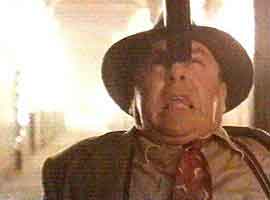|
|
|
|
|
|
|
|
|
|
|
|
|
|
 |
|
|
|
|||||||||
|
|
|
|
|
|
|
|||||||
|
|
|
|
|
|
||||||||
|
|
||||||||||||
|
|
|
|||||||||||
|
|
||||||||||||


Syndicate!

Affiliates:



The Toque
Geek of the Day
Biting Satire
Barry the Bachelor
Evil Guide
Start your own Cult
Funny Feed
Humor Planet
Conspiracy Network
Grouchy Joe
Paranormal Cafe
All Dumb
Busted Tees
Defunker
 |
BARTON FINK 1991, Dir. Joel Coen 116 min. Rated R. Starring: John Turturro, John goodman, Judy Davis, John Mahoney. Review by Noel Wood |
THEORY #3:
"Cerebral"
If there were any one word I would use to describe BARTON FINK, it would be "cerebral". One thing that truly ties this film together with the viewer is the simultaneous use of the noodle. The noggin. The brain. The head. You have to be able to read Barton's thoughts in order to feel the things that he does in this picture in order to truly enjoy it. Not that it's necessary to sympathise with him, but it helps to be able to get inside the skull of Barton Fink.
 That out of the way, I'd like to add a bit of my own observation to the film and its meaning which has already been readily discussed here. We've talked about the snobbery of the artist, the way Barton feels he is in a personal hell even though what he is experiencing is trivial to the common man. The heat bothers him. The bellboy annoys him. The wallpaper distracts him. The salesman makes him nervous. But the interesting thing here is you have to put yourself in Barton's shoes while watching this movie. I found his character to be pretentiously reprehensible, but at the same time I felt the same way he did about such nuances as the wallpaper. I didn't WANT to sympathise with the character, but in a way I did. And you also have to realize that Barton Fink is working out of his element. He's used to writing for the stage, and for a few dollars more he's opted to lend his talents to Hollywood and write something with which he's not experienced. So you can't take the view that the film is totally in criticism of the artist.
That out of the way, I'd like to add a bit of my own observation to the film and its meaning which has already been readily discussed here. We've talked about the snobbery of the artist, the way Barton feels he is in a personal hell even though what he is experiencing is trivial to the common man. The heat bothers him. The bellboy annoys him. The wallpaper distracts him. The salesman makes him nervous. But the interesting thing here is you have to put yourself in Barton's shoes while watching this movie. I found his character to be pretentiously reprehensible, but at the same time I felt the same way he did about such nuances as the wallpaper. I didn't WANT to sympathise with the character, but in a way I did. And you also have to realize that Barton Fink is working out of his element. He's used to writing for the stage, and for a few dollars more he's opted to lend his talents to Hollywood and write something with which he's not experienced. So you can't take the view that the film is totally in criticism of the artist.
At the same time, the film makes you feel for the common man. John Goodman's character is very convincing. We feel in touch with his everyman persona and understand how he's truly had to work for what he has. We realize that without the Charlie Meadows of the world, there would be no place for the Barton Finks. The opposite, however, is not entirely true. But when the film draws to a finale, as we've begun to feel more sympathetic for the everyman character, the tables are turned and Barton turns out to be the good guy after all. Sure, he looks down his nose at the salesmen and hotel clerks of the world, but at least he's not a serial killer.
Going back to the idea that the movie is about "Heads", which is an astute observation but needs some weight to support it, we see that Barton Fink does indeed covet his own head. It's his prized possession, and he can use it to deflect his shortcomings elsewhere. When the movie exec is worried that the picture won't be completed by deadline, Barton simply points to his head and says it's all there. And because of his status as an artist, he is able to get away with such. Whether or not he's being honest is another story, but Barton's reputation allows him to get away with it.
 Another underlying aspect of this film that has not yet been touched upon is the idea of the muse. Shakespeare was often known for having a muse, a lovely woman who would be his inspiration for a project. Barton seeks his muse in a picture on the wall, but it doesn't seem to be productive. Rather, it turns out to be distracting. It's not until Charlie has to disappear for a few days and leaves Barton Fink a mysterious package that he is able to complete his wrestling movie. The box appears to be his muse. He doesn't open it or put too much thought of what's contained within, but it still seems to guide him in to finishing his project. Granted, it's a safe bet that the box contains the head of Audrey Taylor, but we don't know for sure. Neither does Barton, but I think he's pretty sure of it. So at the end of the picture, we see Barton on the beach with both his intended muse and the ironic default muse content with himself, even after the horrible things that have happened to him. Perhaps Barton has reached an epiphany and realizes the role of the everyman, or perhaps not. It's really irrelevant at this point.
Another underlying aspect of this film that has not yet been touched upon is the idea of the muse. Shakespeare was often known for having a muse, a lovely woman who would be his inspiration for a project. Barton seeks his muse in a picture on the wall, but it doesn't seem to be productive. Rather, it turns out to be distracting. It's not until Charlie has to disappear for a few days and leaves Barton Fink a mysterious package that he is able to complete his wrestling movie. The box appears to be his muse. He doesn't open it or put too much thought of what's contained within, but it still seems to guide him in to finishing his project. Granted, it's a safe bet that the box contains the head of Audrey Taylor, but we don't know for sure. Neither does Barton, but I think he's pretty sure of it. So at the end of the picture, we see Barton on the beach with both his intended muse and the ironic default muse content with himself, even after the horrible things that have happened to him. Perhaps Barton has reached an epiphany and realizes the role of the everyman, or perhaps not. It's really irrelevant at this point.
I do like the idea that Chad presented earlier, in that the film is a warning to the artist to beware of the common man. It really works without glamourizing or downplaying any of the roles involved. But I still think that the movie is about heads.

For questions, comments, or the occasional stalking letter, send mail to Noel Wood. Please give proper credit when using any materials found within this site.